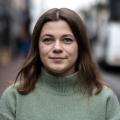
Making my way from The Argus's Bond Street office to the Dome in Brighton's Church Street last night, I was shocked, though not surprised, to see queues down the street.
Some 1,500 people had flocked to the much-loved venue to see one of Britain's most famous living historians David Olusoga.
The show had completely sold out in spite of its illusive title An Evening with David Olusoga.
After the audience settled into their seats, Nabihah Iqbal, Brighton Festival's guest director gave a heartfelt introduction - Olusoga has mentored Iqbal in the past, and there was genuine chemistry between the pair which was a joy to watch.

Olusoga began with a 20-minute presentation about why he loves history, and why he does what he does.
It was fascinating to hear about how Olusoga came to history. Growing up in Gateshead in the 1980s, it was unavoidable.
"Everyone was obsessed with World War Two. All the films were about World War Two, all my toys were plastic soldiers," Olusoga said.
But Olusoga also noticed there was no one like him in the stories. Black narratives in the war were erased such that when Olusoga's mother told him about war memorials to soldiers in his birth country Nigeria, he didn't believe her.

By the time he was 14, history came "smashing into his window" when the National Front threw bricks at his home, forcing himself and his family to move into emergency accommodation.
"I had no choice but to learn where this came from," said Olusoga.
- READ MORE: The best free events at Brighton Festival
Olusoga told the awestruck crowd how he has traced the origins of racism in his studies.
And he is hopeful - "what can be constructed, can also be deconstructed".

After his speech, Iqbal and Olusoga talked through salient points.
Olusoga uses a great deal of metaphors, of history's "half-truths" and "missing chapters", but they feel apt and don't seem hackneyed.
Then it was time for audience questions, which descended into some level of chaos when the microphones didn't work and people began shouting "I have a question".
Iqbal and Olusoga handled it well and it was great to see a deaf woman sign her question to interpreters who were able to translate it for Olusoga - they had also been signing the whole show which was livestreamed to even more people.
The most memorable question was one which asked Olusoga why he does what he does.
"History is about telling stories," he said. "I tell stories."



Comments: Our rules
We want our comments to be a lively and valuable part of our community - a place where readers can debate and engage with the most important local issues. The ability to comment on our stories is a privilege, not a right, however, and that privilege may be withdrawn if it is abused or misused.
Please report any comments that break our rules.
Read the rules here